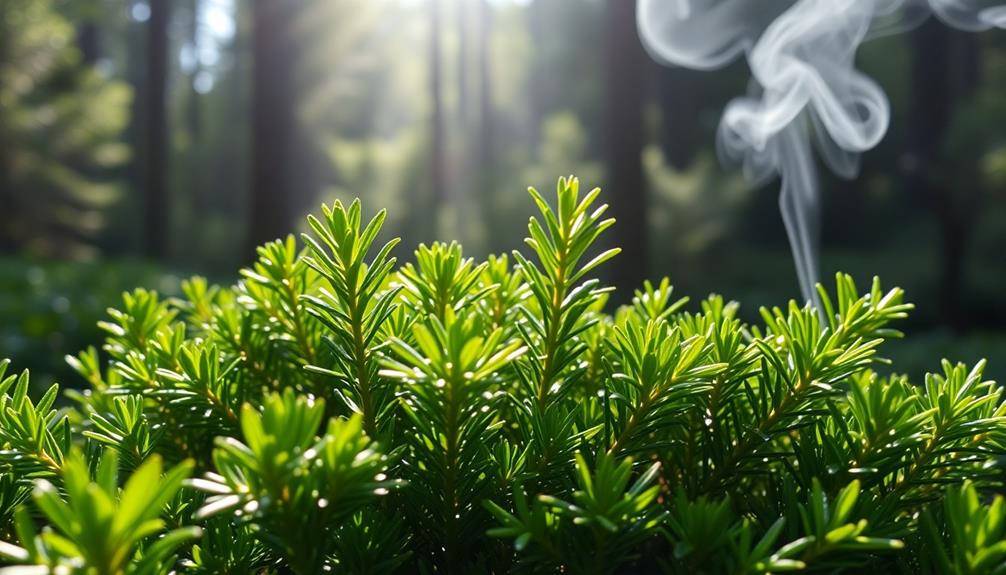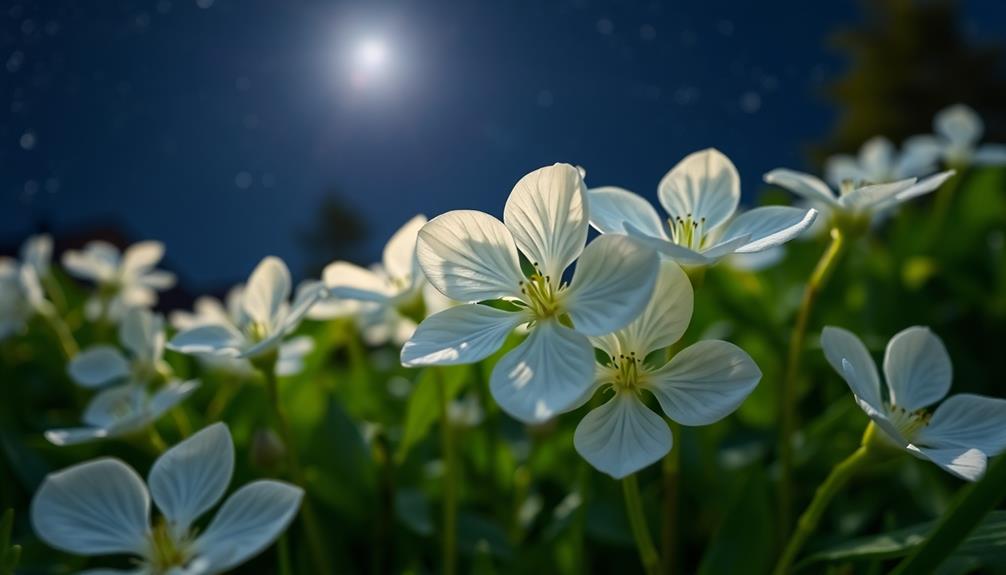Cypress has a unique and refreshing fragrance that many find captivating. It combines bright, earthy, and woodsy notes with a touch of sweetness, creating an uplifting aroma. You might notice hints of coniferous trees, reminiscent of pine or juniper. Variations exist depending on the species, where French cypress is deeper and woodier while Spanish cypress feels fresher and greener. This scent is perfect for outdoor spaces or relaxing settings like spas. Cypress can evoke feelings of tranquility and calm, making it a popular choice for aromatherapy. Keep exploring to discover more about this delightful aroma's rich history and benefits!
Key Takeaways
- Cypress has a distinctive and inviting scent, combining clean, spicy, and woody notes reminiscent of coniferous trees.
- The aroma presents a refreshing quality, transitioning from mentholated freshness to a vanillary sweetness over time.
- Variations among species, like French and Spanish cypress, offer earthy, woodsy, or brighter, leafy characteristics.
- Cypress scent evokes tranquility, making it popular for relaxation in spas, meditation rooms, and home ambiance.
- The essential oil should be diluted before skin application and used in moderation for inhalation to avoid irritation.
Introduction

Cypress is more than just a tree; it embodies a unique fragrance that captivates many. When you think of cypress, imagine a clean, spicy, and woody scent that brightens your day. This aroma isn't just pleasant; it's uplifting and stimulating to your senses.
You might notice its similarities to other coniferous scents like pine and juniper, but cypress adds its own twist with a hint of peppery sweetness.
If you explore cypress essential oils, you'll find different species offer varying aromas. For instance, French cypress gives off an earthy, woodsy scent, while Spanish cypress surprises you with its bright, camphorous notes.
You might even discover a mentholated aroma that shifts to a soothing, vanillary quality as it dries down.
As you experience cypress, it's fun to note how others perceive its scent. Some detect herbaceous or resinous hints, while others think of fresh-cut pine wood or rosemary.
Each person's experience can be different, making cypress a fascinating fragrance to explore. So, whether you're using cypress in essential oils or simply enjoying its scent, you're in for a delightful journey!
Description of the Smell

You'll quickly notice that the smell of cypress is both distinctive and inviting. When you take a whiff, you're met with a clean, spicy, and woody fragrance that feels refreshing. Think of it as a mix of sweetness and dryness, reminding you of coniferous trees like pine and juniper. It's truly an aromatic experience!
Different cypress species offer unique scents. For example, French cypress has earthy, woodsy notes, while Spanish cypress surprises you with a brighter, leafy quality.
As you explore cypress oil, you might detect a mentholated aroma that softens into delightful, vanillary qualities over time. This transformation makes it so special.
Many people describe their experiences with cypress scent as uplifting, with herbaceous and mildly resinous notes adding to its charm. This makes cypress an essential choice in the perfume industry, where its invigorating qualities create fresh and vibrant fragrances.
Whether you're enjoying a candle or a perfume, the cypress smell is sure to elevate your mood. So, next time you encounter cypress, take a moment to breathe it in and enjoy the wonderful journey it offers!
Source and Composition

Different species of cypress can change the scent profile. For example, French cypress offers an earthy, woodsy aroma, while Spanish cypress is brighter and leafier.
The method of distillation also plays a key role in shaping the essential oil's scent. Some distillation techniques create long-lasting notes that can transition toward a vanillary sweetness.
Cypress fragrance is similar to other coniferous scents, like pine and juniper, giving it a herbaceous and mildly resinous aroma.
Typical Scenarios or Environments

In serene outdoor settings—like parks and gardens—the scent of cypress creates a refreshing atmosphere that evokes the tranquility of nature. When you take a deep breath, you'll notice its clean, spicy, and woody aroma, reminiscent of a peaceful forest. This scent is perfect for relaxation, making it a popular choice in spaces like spas and meditation rooms.
You can also find cypress in urban environments, where its trees provide a calming contrast to the busy city life. The presence of cypress in landscaping not only beautifies the area but also adds a hint of nature's essence, making you feel more connected to the outdoors.
Cypress essential oil is often used in scented candles and diffusers, allowing you to bring that wonderful scent into your home. By using this oil, you can create a calming atmosphere that helps reduce stress after a long day.
Imagine lighting a cypress candle while you unwind with a good book or soothing music. It's a simple way to enhance your relaxation experience and embrace the natural world, wherever you are.
Emotional or Cultural Associations

Cypress carries deep emotional and cultural associations that span centuries and continents. When you think of cypress, you might picture it standing tall in old cemeteries, often linked to themes of loss and remembrance. Many cultures, including ancient Egyptians and Greeks, have used cypress in funerary practices, showcasing its importance in honoring the deceased.
In Greek mythology, the story of Cyparisse highlights this connection to sorrow, reminding us that cypress symbolizes not just death but also the immortal soul. Its fragrant profile adds another layer to its significance. The calming scent of cypress evokes feelings of tranquility, making it a popular choice in aromatherapy. When you inhale its aroma, you might feel more grounded, especially during stressful times or moments of grief.
Historically, cypress has been used to craft urns and coffins, symbolizing protection against evil spirits and eternal life. This deep-rooted cultural significance makes cypress more than just a tree; it's a reminder of our connections to those we've lost and the peace we seek in remembering them.
Embracing cypress can help you navigate life's challenges while honoring the memories of loved ones.
Health or Safety Considerations

When using cypress essential oil, it's crucial to keep health and safety in mind. While this oil is mainly used for its calming effects and pleasant aroma, it's important to be cautious.
Always dilute cypress oil before applying it to your skin, as it can cause irritation in sensitive individuals. A patch test on a small area is a great way to check for any reactions before using it widely.
If you decide to inhale cypress oil, enjoy its soothing qualities, but remember to use it in moderation. Excessive exposure might lead to headaches or respiratory irritation for some.
If you're pregnant, nursing, or have specific health conditions, consult a healthcare professional before using cypress oil, since its effects during these times aren't well-documented.
Also, be aware that cypress oil contains compounds that may affect blood clotting. If you're taking blood thinners, it's wise to seek medical advice before using cypress products.
Lastly, make sure you buy cypress essential oil from reputable suppliers to ensure its purity and safety. Keeping these health considerations in mind will help you enjoy the benefits of cypress oil safely!
Final Thoughts

Ultimately, exploring the scent of cypress reveals a complex and captivating fragrance that appeals to many. You might find it clean and spicy, evoking feelings of being surrounded by nature. This scent often reminds people of pine and juniper, with earthy and woody undertones that create a warm, comforting atmosphere.
When you try cypress essential oil, you'll notice its long-lasting quality. As it dries down, the aroma transitions from a refreshing mentholated scent to sweeter, vanillary notes. This unique transformation makes it a fascinating choice for various uses, from aromatherapy to personal fragrance.
Different species of cypress offer distinct scent profiles. For instance, French cypress provides deeper earthy notes, while Spanish cypress has a brighter and more camphorous scent. You might even pick up on herbaceous or oily characteristics that add to its richness.
With user experiences varying widely, you could discover terpenic, resinous, or even hashish-like elements in the scent. The aroma can shift depending on the strain, environment, or even the individual’s perception, offering a diverse olfactory journey. Some have reported hints reminiscent of forest pine and earth, while others describe undertones that resemble what mercury smells like—sharp, metallic, almost otherworldly. These nuances contribute to the complexity, making each scent profile unique to the person experiencing it.
Frequently Asked Questions
What Does Cypress Scent Smell Like?
When you encounter cypress scent, you'll notice a clean, woody aroma with hints of spice. It feels fresh and invigorating, reminiscent of pine, yet uniquely complex with sweet and dry undertones that uplift your spirit.
Does Cypress Smell Like Mint?
Cypress doesn't smell like mint. Instead, you'll find a clean, woody aroma that's dry and aromatic. While mint can complement cypress in blends, the two scents are distinctly different in character.
Do Cypress and Cedar Smell the Same?
Cypress and cedar don't smell the same. You'll notice cypress has a brighter, more uplifting aroma, while cedar offers a deeper, warmer scent. Both are unique, with distinct characteristics that set them apart. Cypress is often described as having a fresh, clean scent that can evoke feelings of clarity and renewal, making it a favorite in energizing blends. In contrast, cedar’s aroma is grounding and comforting, with the cedarwood fragrance profile known for its rich, woody tones that have long been prized in calming scents. Both essences are versatile, yet they serve different purposes depending on the mood or ambiance you wish to create.
What Does Cyprus Smell Like?
When exploring the scent, you'll find it's a clean blend of woody and spicy notes. You might also detect earthy qualities, sometimes reminiscent of fresh-cut pine, creating a refreshing and uplifting aromatic experience.









